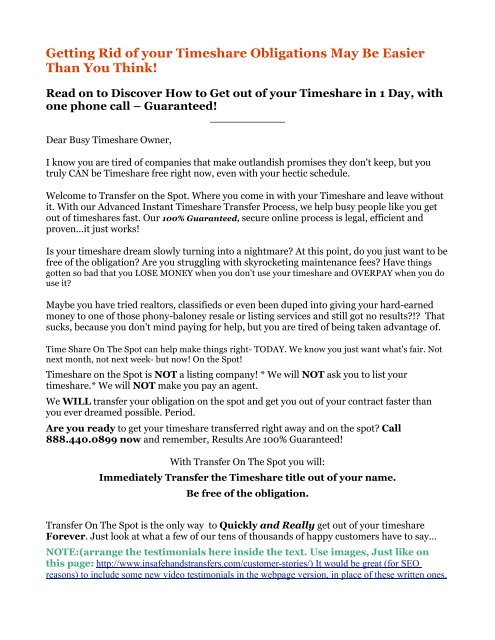The brand-new regulations are detailed in the Authorities Mexican Standard (NOM), which consists of a series of official standards and regulations appropriate to varied activities in Mexico. The list below organizations were included during the brand-new standardization: NOM is formally called: "NOM-029-SCFI-2010, Commercial Practices and Information Requirements for the Rendering of Timeshare Service". It developed the following standards: Marketing business are not enabled to provide gifts and get for potential timeshare owners without plainly specifying the real purpose of the deal. The requirements to cancel a timeshare contract should be more useful and less challenging. NOM recognizes the personal privacy rights of timeshare consumers.
Verbal guarantees need to be written and developed in the original timeshare contract. The timeshare supplier must comply with all commitments written in the timeshare contract, in addition to the internal guidelines of the timeshare resort. The charges that are intended to be made to the customer must be plainly and plainly specified on the timeshare application kinds, consisting of the membership cost, and all extra charges (maintenance fees/exchange club costs). To make the new regulations suitable to any individual or entity that provides timeshares, the meaning of a timeshare provider was substantially extended and clarified. If the timeshare supplier does not follow the guidelines decreed in NOM, the repercussions might be considerable, and might include monetary penalties that can vary from $50.
00 Owners can: [] Utilize their usage time Lease their owned usage Give it as a present Donate it to a charity (must the charity choose to accept the problem of the associated upkeep payments) Exchange internally within the same resort or resort group Exchange externally into thousands of other resorts Offer it either through standard or online advertising, or by utilizing a certified broker. Timeshare contracts permit transfer through sale, however it is hardly ever accomplished. Recently, with many point systems, owners may elect to: [] Assign their usage time to the point system to be exchanged for airline tickets, hotels, travel plans, cruises, theme park tickets Instead of leasing all their actual usage time, rent part of their points without actually getting any use time and use the rest of the points Lease more points from either the internal exchange entity or another owner to get a larger system, more getaway time, or to a much better location Save or move points from one year to another Some designers, however, might restrict which of these choices are readily available at their particular properties. how to get out of a holiday inn club timeshare.
In numerous resorts, they can rent their week or offer it as a gift to loved ones. Used as the basis for bring in mass attract purchasing a timeshare, is the concept of owners exchanging their week, either separately or through exchange companies. The 2 largestoften mentioned in mediaare RCI and Period International (II), which integrated, have more than 7,000 resorts. They have resort affiliate programs, and members can only exchange with affiliated resorts. It is most typical for a resort to be affiliated with only one of the bigger exchange companies, although resorts with dual affiliations are not uncommon.

RCI and II charge a yearly membership charge, and additional costs for when they find an exchange for a requesting member, and bar members from leasing weeks for which they currently have exchanged. Owners can also exchange their weeks or points through independent exchange companies. Owners can exchange without needing the resort to have an official affiliation arrangement with the companies, if the resort of ownership consents to such arrangements in the initial contract. Due to the pledge of exchange, timeshares frequently sell despite the area of their deeded resort. What is seldom disclosed is the distinction in trading power depending upon the location, and season of the ownership.
However, timeshares in extremely desirable locations and high season time slots are the most pricey worldwide, based on require typical of any heavily trafficked vacation area. An individual who owns a timeshare in the American desert neighborhood of Palm Springs, California in the middle of July or August will possess a much reduced capability to exchange time, because fewer pertained to a resort at a time when the temperatures remain in excess of 110 F (43 C). A significant distinction in https://www.taringa.net/whyttajldk/fascination-about-how-to-get-rid-of-timeshare-without-ruining-credit_50jss9 kinds of holiday ownership is between deeded and right-to-use agreements. With deeded agreements using the resort is normally divided into week-long increments and are sold as real estate by means of fractional ownership.
The 7-Minute Rule for What Are The Difference Types Of Timeshare Programs Available For Purchase?
The owner is also accountable for an equal portion of the property tax, which normally are gathered with condominium maintenance fees. The owner can possibly deduct some property-related costs, such as property tax from taxable income. Deeded ownership can be as complex as outright property ownership because the structure of deeds vary according to regional property laws. Leasehold deeds are common and deal ownership for a set duration of time after which the ownership goes back to the freeholder. Periodically, leasehold deeds are provided in perpetuity, however numerous deeds do not communicate ownership of the land, but merely the apartment or system (real estate) of the lodging.

Thus, a right-to-use contract grants the right to use the resort for a specific variety of years. In numerous countries there are serious limits on foreign home ownership; hence, this is a common technique for establishing resorts in nations such as Mexico. Care must be taken with this type of ownership as the right to utilize often takes the type of a club membership or the right to utilize the appointment system, where the appointment system is owned by a company not in the control of the owners. The right to use may be lost with the demise of the controlling company, since a right to use purchaser's agreement is normally only excellent with the existing owner, and if that owner sells the property, the lease holder could be out of luck depending upon the structure of the contract, and/or existing laws in foreign locations.
An owner might own a deed to use a system for a single specific week; for example, week 51 normally consists of Christmas. An individual who owns Week 26 at a resort can use just that week in each year. In some cases units are offered as floating weeks, in which an agreement specifies the number of weeks held by each owner and from which weeks the owner may select for his stay. An example of this may be a floating summer week, in which the owner might choose any single week throughout the summertime. In such a circumstance, there is most likely to be greater competition throughout weeks featuring holidays, while lesser competition is likely when schools are still in session.